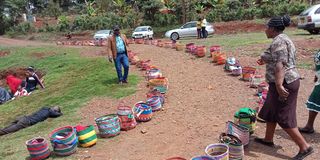Nyeri elderly women graduate with kiondo-making skills

Some of the African baskets that were made by a group of women in Mukurwe-ini, Nyeri County.
When Mr Robert Gatoho was growing up, he used to observe his grandmother carrying the African basket, commonly referred to as ‘kiondo’ in the Kikuyu language, everywhere she went. Traditionally, the kiondo was a symbol of womanhood among the Kikuyu community.
Mr Gatoho – born and raised in Kimondo, Mukurwe-ini, Nyeri County – is spearheading an empowerment programme to equip women with handcraft skills in his community.
The programme includes basketry, sewing, baking, beadwork, carving, crocheting and detergent-making. The programme, offered for free, is meant to empower the women economically and preserve the Kikuyu culture of weaving kiondo.
Mr Gatoho is a secondary school teacher undertaking a doctorate in philosophy at Kenyatta University. Nevertheless, his passion to transform women in his community pushed him to form the Gatoho Foundation.
At first, the 33-year-old had five students from his village but the number has grown to 603, including young and elderly women from the entire Mukurwe-ini constituency. They are divided into 13 groups.
“The adult education programme I run in my village started with this very basic art where the elderly students in my class aged 80 and above passed the skill on to the younger generations,” Mr Gatoho tells Nation.
“Well, the young ones initially displayed disinterest in learning the art, terming it too old-fashioned. As a result, I made it compulsory for all my adult students to learn that art. They carry books and lunch when attending my classes, and go shopping using kiondo.”

Women during their graduation ceremony at Kimondo village in Mukurwe-ini, Nyeri County on July 30, 2022. They underwent training on basketry, sewing, baking, beadwork, curving, crocheting and detergent-making.
Last year, the foundation’s first batch of 16 women graduated. Last Saturday, 161 more graduated.
“This number has grown due to thorough campaigns that we have conducted in the villages. This is a way of appreciating our mothers because they sacrificed a lot to pay for our education. I thank God for giving me the energy and time to educate my mothers,” Mr Gatoho said.
Ms Esther Wangui, 60, graduated with skills in basketry.
“I will be able to make my own baskets and sell them to my clients. For instance, one basket costs Sh1,000 and it takes me about one week to complete it. I spend Sh500 to purchase raw materials and this means I will be able to earn a profit of Sh500 after selling a single unit,” Ms Wangui says.
“A majority of us were suffering from blood pressure due to lack of income. But after acquiring training, we are able to sell our items and pay for the education of our children.”
Mukurwe-ini-based lawyer Levi Munyeri said the programme has transformed the economy of the constituency positively by creating more wealth for women.
“This graduation ceremony shows the importance of women empowerment in our community. Previously, these women did not have sources of income. Now, they will be able to provide for their families amicably. Most of them are breadwinners in their families,” Mr Munyeri said.

Mr Robert Gatoho who is the founder of Gatoho foundation whose 161 women graduated at Kimondo village in Mukurwe-ini, Nyeri County on July 30, 2022. They underwent training on basketry, sewing, baking, beadwork, curving, crocheting and detergent-making.
“I am happy to see the women making world-class baskets which are handwoven. We are very much happy as residents of Mukurwe-ini for what the Gatoho foundation is doing for our parents in villages.”
Area MP Anthony Kiai said many women have been delivered from poverty by being given the platform to participate in the country’s economic growth.
“I have seen these women develop economically through the skills [they have acquired]. Through this initiative, Mr Gatoho ensures that women who are illiterate undergo literacy programmes. I am one of their clients and I have contracted a number of them to bake bread and cakes,” Mr Kiai said.
Mr Gatoho plans to open an economic centre in Mukurwe-ini town where more women can be trained.
“I have a vision of opening a hub in Mukurwe-ini where women can meet daily and gain handcraft skills so that they can produce more items and meet growing demand. The challenge we have is lack of classrooms. We meet and learn under trees,” he said.





